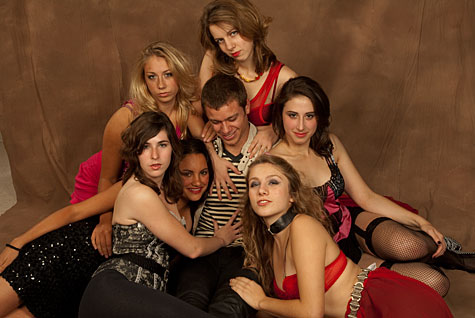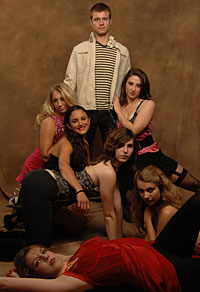
The cast of The Threepenny Opera, presented Oct. 22-31 by the Performing Arts Department in Arts & Sciences. Photo by David Kilper/WUSTL Photo Services. Download hi-res version.
Oh the shark has pretty teeth dear/And he shows them pearly white …
So is introduced Macheath, the dapper bandit and notorious womanizer more infamously known as “Mack the Knife.” And thus begins The Threepenny Opera, a merciless send-up of operatic conventions that has itself become one of the iconic works of 20th-century musical theater.
This month, Washington University’s Performing Arts Department (PAD) in Arts & Sciences will present The Threepenny Opera as its fall Mainstage production.
Performances will take place in the university’s Edison Theatre at 8 p.m. Friday and Saturday, Oct. 22 and 23; and at 2 p.m. Sunday, Oct. 24. Performances will then continue the next weekend, at 8 p.m. Oct. 29 and 30; and at 2 p.m. Oct. 31.
Edison Theatre is located in the Mallinckrodt Center, 6445 Forsyth Blvd. Tickets are $15, or $10 children, students, seniors and Washington University faculty and staff. Tickets are available through the Edison Theatre Box Office, (314) 935-6543, and through all MetroTix outlets.
For more information, call (314) 935-6543 or visit padarts.wustl.edu/

The Threepenny Opera
Written in 1928 by Bertolt Brecht and composer Kurt Weill, The Threepenny Opera is the quintessential work of Weimar-era Berlin as well as the inspiration for subsequent shows such as Cabaret, Chicago and Urinetown. The story is largely adapted from The Beggar’s Opera (1728), a hugely popular parody of then-popular Italian opera by the English satirist John Gay.
Like Gay, Brecht and Weill sought to create an opera “by and for beggars,” infusing the form with Jazz Age wit and modern political bite. The evening begins with a mock-Baroque overture, followed by a brief prologue in which a shabbily dressed singer briefly chronicles Macheath’s legendary life of crime.
The real trouble starts when the roguish Macheath marries Polly, defiant daughter of Jeremiah Peachum, boss of beggars in pre-Victorian London. Outraged, Peachum and his wife use their considerable influence to have Macheath arrested, despite the latter’s friendly relations with police chief Tiger Brown. Always one step ahead of the law, Macheath prepares to leave town, but stops to visit his favorite brothel, where he is betrayed to authorities by an ex-lover, Jenny.
‘Small, bad people in a big, bad world’
“This is a story about small, bad people in a big, bad world,” says Jeffery Matthews, coordinator of the PAD’s Acting & Directing Program, who directs the cast of 33. “Macheath is the ultimate hedonist, driven by the pursuit of pleasure. And we like him, though we also see that he’s a bad man. Nobody is good in this play.”
The unique stage design, by Sean Savoie, coordinator of the PAD’s Design-Technical Theatre Program, embodies the play’s mixture of operatic lushness and Spartan circumstances. The set itself is a simple black box, with a system of risers on which various scenes are enacted.
Dividing the actors from the audience is a large, semi-transparent scrim, upon which images, backdrops, scene titles and even film clips can be broadcast.
“Threepenny is typically done in a ‘poor theatre’ style that parodies grand opera,” Matthews says. Yet in today’s theatre, such opulence is increasingly achieved with state-of-the-art lighting and projection. “I was interested in taking that technology and using it to, in a way, parody itself.
“The scrim also helps the action flow quickly,” says Matthews, who was inspired by the pioneering work of director Bob McGrath at the Ridge Theatre in New York. “You never have to stop to get reset. Actors just ‘appear’ onstage when you light them. For the audience, it’s as if you’re inside on a bright sunny day, looking through a screen at someone outdoors.
“As far as I know, nothing like it has ever been done in St. Louis before,” Matthews says. “Technically, I think it’s the most challenging show that we’ve ever undertaken, and it’s very demanding for the actors. They really have to hit their spots.
“But I think the results will be worth it.”
Cast and crew
The cast is led by juniors Daniel Davis and Marissa Barnathan as Macheath and Polly, with senior Jonathan Levinson and sophomore Emily Fajardo as the Peachums. Senior Sally Wippman is Jenny. Juniors Ari Scott and Megan Lacerenza are Tiger Brown and his daughter, Lucy, another of Macheath’s former girlfriends. Freshman Scott Jensen is the ballad singer.
Costumes are co-designed by Bonnie Kruger, professor in the practice of drama and director of the costume shop, and Michael Drummond, recently a contestant on Bravo’s Project Runway.
Choreography is by Christine Knoblauch-O’Neal, professor of the practice of dance. Musical direction is by Henry Palkes, accompanist in the Department of Music in Arts & Sciences.
|
WHO: Washington University’s Performing Arts Department WHAT: The Threepenny Opera, by Bertolt Brecht and Kurt Weill; directed by Jeffery Matthews. WHEN: 8 p.m. Friday and Saturday, Oct. 22 and 23; 2 p.m. Sunday, Oct. 24; 8 p.m. Friday and Saturday, Oct. 29 and 30; 2 p.m. Sunday, Oct. 31 WHERE: Edison Theatre, located in the Mallinckrodt Center, 6445 Forsyth Blvd. COST:$15; $10 for seniors, students and Washington University faculty and staff. Available at the Edison Theatre Box Office, (314) 935-6543, and all MetroTix outlets. INFORMATION: (314) 935-6543 or padarts.wustl.edu/ |